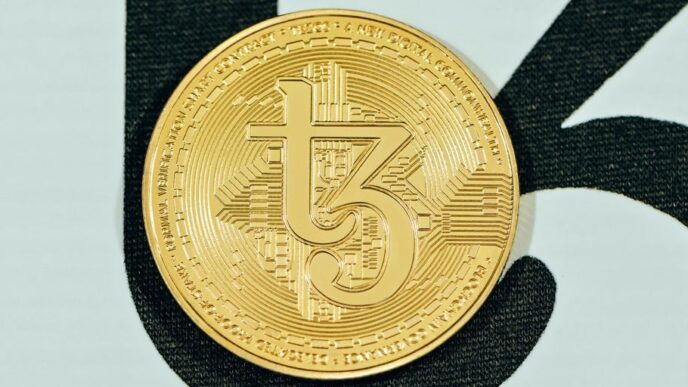Blockchain technology has been making waves in the digital world for quite some time now, and it’s not hard to understand why. With its ability to provide enhanced data and transaction security, blockchain is revolutionizing the way we conduct business online. In this blog post, we’ll explore what blockchain technology is all about and how it can be leveraged to bolster data and transaction security. We’ll also take a look at some companies that are already using blockchain for this purpose. So buckle up, because we’re about to dive into the exciting world of blockchain!
What is Blockchain Technology?
At its core, blockchain technology is a decentralized and distributed ledger that records transactions across multiple computers. In other words, it’s a secure database that can be accessed by anyone with an internet connection.
One of the key features of blockchain is its ability to create a secure network without the need for intermediaries such as banks or governments. This makes it particularly useful for conducting online transactions in a safe and efficient manner.
Another important aspect of blockchain technology is the use of cryptography to ensure data security. Each transaction on the blockchain is encrypted using complex mathematical algorithms and can only be decrypted by those with permission to do so.
Furthermore, each block added to the chain contains unique information about previous blocks in addition to new transactions. This creates an immutable record that cannot be altered retroactively without affecting subsequent blocks in the chain.
Blockchain technology offers unparalleled levels of security and transparency when it comes to recording digital transactions. As we’ll see later on in this post, many businesses are already taking advantage of these benefits to enhance their data and transaction security protocols.
How can Blockchain be used for Data and Transaction Security?
Blockchain technology has revolutionized the way data and transactions are handled in various industries. Blockchain can be used for data and transaction security by providing a decentralized platform that secures information using cryptography.
One of the key benefits of blockchain is its ability to provide a tamper-proof record of all transactions. All participants on the network have access to this ledger, which ensures transparency and immutability. This makes it difficult for malicious actors to manipulate or corrupt the data stored on the blockchain.
Furthermore, blockchain technology uses consensus algorithms such as Proof-of-Work (PoW) or Proof-of-Stake (PoS) to ensure that all parties involved in a transaction agree before any changes are made. This provides additional security measures against potential fraud or hacking attempts.
Another advantage of using blockchain for data and transaction security is its ability to eliminate intermediaries such as banks, reducing costs and improving efficiency. By removing middlemen from transactions, there is less risk of human error or manipulation.
Blockchain provides numerous benefits when it comes to securing sensitive information and crucial transactions. Its decentralized nature combined with strong encryption methods ensures that data remains secure while providing an efficient means of conducting business without intermediaries getting in between parties.
The Benefits of Blockchain Technology for Data and Transaction Security:
Blockchain technology provides numerous benefits for data and transaction security. First and foremost, it offers transparency in transactions by maintaining a public ledger that can be accessed by anyone on the network. This ensures accountability and reduces fraudulent activities.
Moreover, blockchain technology is decentralized, meaning there is no need for a central authority to control the system. This decentralization makes it very difficult for hackers to manipulate or compromise the system as they would need to target multiple nodes simultaneously.
Another significant benefit of blockchain technology is immutability. Once information is stored on the blockchain network, it cannot be altered or deleted without consensus from all participants in the network. This ensures that all records are accurate and tamper-proof.
Furthermore, due to its decentralized nature, blockchain technology also eliminates intermediary costs associated with traditional financial transactions such as banks or brokers – saving time and money for businesses.
Using blockchain for data and transaction security enhances privacy since users can remain anonymous while engaging in transactions on the network.
These benefits make blockchain an ideal solution for companies looking to enhance their data and transaction security while reducing operational costs associated with intermediaries.
Some examples of companies using Blockchain for Data and Transaction Security:
There are various companies across industries that have adopted blockchain technology for enhanced data and transaction security. One such example is IBM, which has created its own blockchain platform called Hyperledger Fabric to secure transactions between business partners.
Another company leveraging the power of blockchain is Walmart. It uses a blockchain-based system to track the supply chain of food products from farm to store shelf, ensuring transparency and authenticity in the process.
In the financial services sector, JPMorgan Chase has developed its own Quorum blockchain platform to facilitate secure and efficient interbank payments. Visa also launched a pilot program using a blockchain-based solution for cross-border payments.
Blockchain technology has found applications beyond finance as well. Everledger uses it to create digital certificates for diamonds, reducing fraud and verifying their origins. In healthcare, Gem partnered with Capital One Healthcare to develop a tamper-proof database for tracking medical credentials.
These examples demonstrate how diverse industries can benefit from using blockchain technology for enhanced data and transaction security. As more businesses explore this innovative solution, we can expect further advancements in security measures across various sectors.
Conclusion:
As we can see, blockchain technology has the potential to revolutionize data and transaction security in various industries. Its decentralized nature makes it difficult for hackers to tamper with information or steal sensitive data. In addition, the use of smart contracts ensures that transactions take place only when certain conditions are met.
Despite its numerous benefits, blockchain technology is still in its early stages of development. However, as more companies continue to adopt it for enhanced security measures, we can expect more advancements and innovations in this field.
Leveraging blockchain technology for enhanced data and transaction security provides a promising solution for businesses looking to protect their assets from cyber threats. By implementing this revolutionary technology into their systems, organizations can ensure secure and transparent transactions while maintaining trust with their stakholders.
In conclusion, blockchain technology is becoming an increasingly popular solution for data and transaction security. Its decentralized nature combined with secure encryption protocols make it difficult for malicious actors to compromise the system. Furthermore, its ability to eliminate intermediaries and reduce operational costs makes it a highly attractive option for businesses across various industries. As this technology continues to evolve, we can expect more companies to leverage its potential for improved data and transaction security in the near future.













